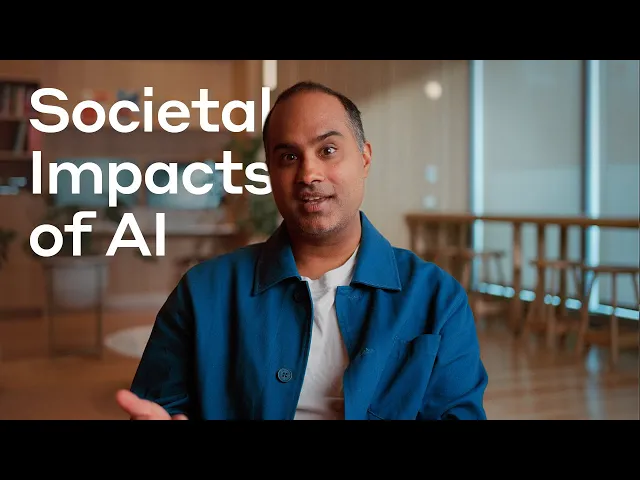The Societal Impacts of AI

AI's profound impact on human behavior
In a world increasingly dominated by digital interactions, the lines between human cognition and artificial intelligence are becoming increasingly blurred. The recent video on "The Societal Impacts of AI" offers a sobering yet hopeful glimpse into our rapidly evolving relationship with AI systems. As these technologies continue to progress at breakneck speed, they're not just changing what we do—they're fundamentally altering how we think.
Key Points
-
AI systems are now intimately integrated into both economic and emotional aspects of human life, from coding and writing to parenting advice and relationship counseling.
-
Despite concerns about automation replacing jobs, current data shows AI is creating new capabilities and forms of work alongside replacing traditional tasks.
-
The rise of AI agents—autonomous systems that can retrieve information, run code, and perform multiple tasks simultaneously—represents a profound shift with far greater economic implications than earlier AI iterations.
-
As humans develop emotional attachments to AI models, sharing intimate details and seeking guidance, we're entering uncharted territory regarding human-machine relationships.
The Most Disturbing Insight: We're Becoming Reflections of Our AI
Perhaps the most profound observation from the video comes when a researcher notes, "These models are not merely reflections of us… I think and I maybe worry that we will also start to see ways in which we're reflections of them." This insight reveals a startling truth that extends beyond the typical concerns about automation or bias.
This psychological and cognitive mirroring is already happening. One developer in the video confesses, "I've started writing code that's more Claude friendly. That's crazy." This subtle adaptation illustrates how humans are beginning to reshape their thinking processes to accommodate AI systems, rather than the other way around. We're witnessing the early signs of a cognitive co-evolution, where human thought patterns begin to align with computational structures.
This matters tremendously because it suggests that AI isn't just a tool we use—it's becoming a framework through which we understand ourselves and our world. The implications for education, creative expression, and even human identity are profound and largely unexplored.
Beyond the Video: The Unexamined Dimensions
The educational equality promise and pitfall
While the video briefly mentions AI's potential to democratize education, it doesn't address the profound inequality
Recent Videos
How To Earn MONEY With Images (No Bullsh*t)
Smart earnings from your image collection In today's digital economy, passive income streams have become increasingly accessible to creators with various skill sets. A recent YouTube video cuts through the hype to explore legitimate ways photographers, designers, and even casual smartphone users can monetize their image collections. The strategies outlined don't rely on unrealistic promises or complicated schemes—instead, they focus on established marketplaces with proven revenue potential for image creators. Key Points Stock photography platforms like Shutterstock, Adobe Stock, and Getty Images remain viable income sources when you understand their specific requirements and optimize your submissions accordingly. Specialized marketplaces focusing...
Oct 3, 2025New SHAPE SHIFTING AI Robot Is Freaking People Out
Liquid robots will change everything In the quiet labs of Carnegie Mellon University, scientists have created something that feels plucked from science fiction—a magnetic slime robot that can transform between liquid and solid states, slipping through tight spaces before reassembling on the other side. This technology, showcased in a recent YouTube video, represents a significant leap beyond traditional robotics into a realm where machines mimic not just animal movements, but their fundamental physical properties. While the internet might be buzzing with dystopian concerns about "shape-shifting terminators," the reality offers far more promising applications that could revolutionize medicine, rescue operations, and...
Oct 3, 2025How To Do Homeless AI Tiktok Trend (Tiktok Homeless AI Tutorial)
AI homeless trend raises ethical concerns In an era where social media trends evolve faster than we can comprehend them, TikTok's "homeless AI" trend has sparked both creative engagement and serious ethical questions. The trend, which involves using AI to transform ordinary photos into images depicting homelessness, has rapidly gained traction across the platform, with creators eagerly jumping on board to showcase their digital transformations. While the technical process is relatively straightforward, the implications of digitally "becoming homeless" for entertainment deserve careful consideration. The video tutorial provides a step-by-step guide on creating these AI-generated images, explaining how users can transform...
